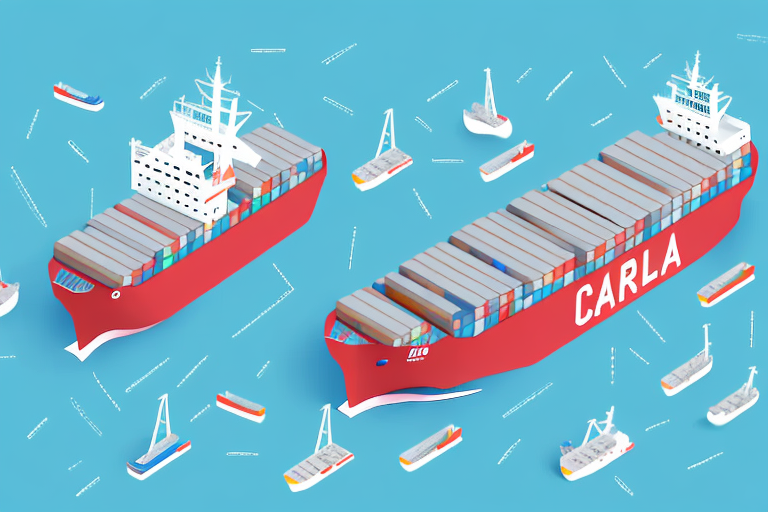Streamlining Bulk Cargo Supply Chains for Maximum Efficiency
Bulk cargo shipping is a cornerstone of international trade, enabling the transport of goods in large quantities by land, sea, or air. The complexity of these processes necessitates streamlined supply chains to enhance efficiency. This article delves into the fundamentals of bulk cargo shipping, explores its challenges, and offers strategies to optimize management through effective packaging and labeling, automated tracking, and risk mitigation.
Understanding the Basics of Bulk Cargo Shipping
Bulk cargo encompasses both dry and liquid goods transported in substantial volumes, including grains, coal, oil, chemicals, and minerals. These goods can be shipped either loose or packaged in barrels, bags, or containers. The choice of transportation mode—air, sea, or road—depends on the type of goods, their final destination, and the most suitable delivery method.
According to the International Maritime Organization, sea transport remains the most cost-effective option for bulk cargo, especially for long-distance shipments. However, it is slower compared to air transport, which, while faster, incurs significantly higher costs.
Safety is paramount in bulk cargo shipping. Different types of cargo may be subject to specific regulations and safety requirements. For instance, hazardous materials necessitate specialized handling and packaging to ensure safe transport. Partnering with a reputable shipping company experienced in handling specific cargo types is essential to meet all safety standards and regulatory compliance.
Identifying the Key Challenges of Bulk Cargo Supply Chains
Bulk cargo supply chains encounter numerous challenges that can impact delivery times and costs:
- High Capital Costs: Handling large volumes requires specialized equipment, leading to increased capital expenditure.
- Remote Storage Facilities: Bulk cargo is often stored in remote locations, incurring additional transportation costs.
- Poor Packaging and Documentation: Inadequate packaging and labeling can cause delays at customs and international borders.
- Theft and Damage: Bulk cargo is vulnerable to theft, loss, and damage, which threaten supply chain efficiency.
- Lack of Standardization: Varying packaging and labeling standards across countries can lead to confusion and delays.
- Environmental Concerns: The significant environmental impact of bulk cargo transportation, particularly greenhouse gas emissions, is increasingly under scrutiny.
Addressing these challenges is crucial for maintaining an efficient and cost-effective bulk cargo supply chain.
How to Choose the Right Mode of Transportation for Bulk Cargo
Selecting the appropriate transportation mode for bulk cargo is vital for ensuring timely and cost-effective delivery. Here are key considerations:
- Type of Cargo: High-value or perishable items like pharmaceuticals typically require air transport for expedited delivery, while non-perishable goods like ores and cement are better suited for sea transport.
- Distance and Destination: Long-distance shipments benefit from sea or air transport, whereas road transport is ideal for local or intermediate distribution.
- Special Handling Requirements: Hazardous or sensitive cargo may necessitate specific transportation modes equipped to handle such goods safely.
- Cost Constraints: Balancing speed and cost is essential; sea transport is generally more economical for large volumes, whereas air transport is costlier but faster.
Ultimately, the choice should be based on a comprehensive evaluation of cargo nature, destination, and budget. Tools like Transportation Management Systems (TMS) can aid in making informed decisions.
The Importance of Proper Packaging and Labeling in Bulk Cargo Shipping
Proper packaging and labeling are critical for the safe and efficient transport of bulk cargo:
- Clear Identification: Labels must accurately reflect the contents, weight, and destination to facilitate smooth handling and compliance with regulations.
- Sturdy Packaging: Secure packaging is essential, especially for fragile or perishable goods, to prevent damage during transit.
- Regulatory Compliance: Packaging and labeling must adhere to international standards to avoid delays and rejection at customs.
Inadequate packaging can lead to cargo damage, resulting in additional costs for repairs or replacements. Moreover, improper labeling can cause confusion, delays, and potential fines. Investing in high-quality packaging and accurate labeling not only reduces costs but also enhances customer satisfaction.
Moreover, sustainable packaging practices can minimize environmental impact. Utilizing eco-friendly materials and reducing waste aligns with growing consumer and regulatory demands for sustainability, potentially attracting environmentally conscious customers.
Streamlining Loading and Unloading Processes to Save Time and Money
Efficient loading and unloading are crucial for minimizing time and costs in bulk cargo operations. Strategies to streamline these processes include:
- Pre-Sorting Cargo: Sorting cargo by destination beforehand can expedite unloading and reduce errors.
- Automated Systems: Implementing conveyor systems and other automated equipment can accelerate the loading and unloading process, reduce human error, and enhance safety.
- Digital Tracking: Utilizing digital tracking systems provides real-time updates on cargo status, improving coordination and quickly addressing any issues that arise.
Adopting these methods can lead to significant savings in time and costs while improving overall operational efficiency.
Leveraging Technology: Automating Bulk Cargo Tracking and Documentation
Technology plays a pivotal role in enhancing bulk cargo supply chain management through automation:
- Electronic Data Interchange (EDI): EDI systems facilitate real-time information sharing with customs, customers, and partners, reducing manual data entry and errors.
- GPS and RFID Tracking: These technologies provide precise information on cargo location and condition, increasing visibility and security.
- Automated Documentation: Digital documents like electronic bills of lading streamline the transportation process by reducing paperwork and expediting transactions.
- Transportation Management Systems (TMS): TMS can analyze shipping routes, carrier performance, and fuel consumption, optimizing routes and reducing costs.
- Cloud-Based Platforms: These platforms enable real-time information sharing and collaboration among supply chain partners, enhancing coordination and decision-making.
Integrating these technologies can lead to more efficient operations, lower costs, and improved customer satisfaction.
Managing Risks in Bulk Cargo Supply Chains: Tips for Mitigation
Effective risk management is essential for maintaining the integrity of bulk cargo supply chains. Key strategies include:
- Partnering with Reputable Logistics Providers: Collaborating with trusted partners minimizes risks of theft and loss.
- Comprehensive Documentation: Maintaining accurate and thorough documentation ensures compliance with regulations and reduces the risk of delays.
- Insurance Coverage: Investing in comprehensive insurance protects against financial losses due to damages or loss of goods.
- Regular Audits and Inspections: Conducting routine checks of cargo and transportation equipment can identify potential risks early.
- Contingency Planning: Developing contingency plans for unexpected events, such as natural disasters or political unrest, ensures preparedness and resilience.
- Advanced Technologies: Utilizing GPS tracking and real-time monitoring enhances visibility and control over cargo, helping prevent theft and damage.
Implementing these risk management practices can safeguard supply chain efficiency and reduce the likelihood of costly disruptions.
Collaborating with Partners: Building Strong Relationships in the Bulk Cargo Industry
Collaboration among stakeholders is vital for the smooth operation of bulk cargo transportation. Building strong relationships with logistics providers, ports, and carriers offers several benefits:
- Trust and Reliability: Long-term partnerships foster trust, enhancing reliability and promoting referrals.
- Cost Savings and Efficiency: Collaborative efforts can identify efficiency improvements and cost-saving opportunities, such as optimized shipping routes or shared resources.
- Improved Communication: Effective communication and transparency prevent misunderstandings and facilitate swift problem resolution.
- Shared Innovations: Partners can collaborate on adopting new technologies and best practices, driving continuous improvement across the supply chain.
By fostering strong partnerships, businesses can enhance their competitive edge and ensure the seamless flow of bulk cargo.
The Future of Bulk Cargo Supply Chains: Trends and Predictions
The bulk cargo industry is evolving with emerging technologies and shifting market demands. Key trends shaping the future include:
- Sustainable Shipping Practices: The adoption of electric, hybrid, and hydrogen fuel-powered vehicles and ships is increasing to reduce environmental impact.
- Automation and Artificial Intelligence: These technologies improve operational efficiency and minimize human error through automated processes and intelligent decision-making.
- Predictive Analytics: Leveraging data analytics helps businesses anticipate demand, optimize supply chains, and enhance strategic planning.
- Blockchain Technology: Blockchain offers enhanced transparency and security in supply chain transactions, reducing fraud and improving data integrity.
- Internet of Things (IoT): IoT devices provide real-time monitoring and data collection, enabling proactive management of supply chain activities.
Embracing these trends can position businesses for greater efficiency, sustainability, and competitiveness in the bulk cargo market.
In conclusion, optimizing bulk cargo supply chains requires a comprehensive approach that addresses transportation modes, packaging and labeling, loading and unloading processes, technological integration, risk management, and strategic partnerships. By implementing effective solutions, businesses can achieve maximum efficiency and gain a significant competitive advantage in the global market.






















